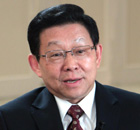Foreign and Military Affairs
Diplomacy goes on for DPRK-ROK tensions
By Qin Jize (China Daily)
Updated: 2010-12-17 07:57
 |
Large Medium Small |
China continues to push for a new round of talks as hostilities run high
BEIJING - State Councilor Dai Bingguo met with United States Deputy Secretary of State James Steinberg on Thursday afternoon, seeking to reduce tensions on the Korean Peninsula amid increased fears of war.
"I am glad to meet you here in Beijing," said Dai, who returned last week for talks in Pyongyang with its top leader Kim Jong-il.
He was quoted by the Xinhua News Agency as saying that he believed Steinberg had conducted candid talks with senior Chinese diplomats on bilateral ties and the Korean Peninsula issue.
Earlier on Thursday, Steinberg met with Deputy Foreign Minister Zhang Zhijun and Wu Dawei, the Chinese special representative for Korean Peninsula affairs.
Steinberg also met with Deputy Foreign Minister Cui Tiankai soon after his arrival in the Chinese capital on Wednesday.
Steinberg will fly to Tokyo on Friday to continue his consultations with Japanese diplomats on the Democratic People's Republic of Korea (DPRK).
Gong Yuzhen, a professor at Peking University, said it is difficult to imagine that a single visit by an American politician can change anything.
Washington has turned down Beijing's proposal for an emergency meeting of the envoys to the Six-Party Talks, which also include the two Koreas, Russia and Japan.
"China has to go on with what it has been doing and the United States understands crystal clear that the cooperation with China will benefit the stability of East Asia - and the whole world as well," he said.
He said the two countries share the same strategic interests, and China has been working hard to maintain the peace and stability of the region.
Foreign Ministry Spokeswoman Jiang Yu on Thursday again called for the resumption of the Six-Party Talks, saying the situation on the peninsula remains sensitive and complicated, and requires all parties concerned to work together to find a solution.
If the situation becomes chaotic, the first to suffer will be the people of the Korean Peninsula, said Jiang, calling on relevant parties to stay calm and refrain from actions that could increase tensions.
In another development, US New Mexico Governor Bill Richardson arrived in Pyongyang on Thursday for a private visit as part of stepped-up US diplomacy to ease regional tensions.
Richardson, who has made numerous trips to the DPRK in the past, said: "when they call me they always want to send a message of some kind."
Richardson said he does not know who he will meet yet, but said he had requested a visit to Pyongyang's main nuclear facility at Yongbyon.
He is expected to return to Beijing on Monday.
The Foreign Ministry of the DPRK, in a statement carried on Thursday by the country's official Korean Central News Agency (KCNA), said that "though we support all proposals for dialogue, including the six-way talks, out of desire to prevent a war on the Korean Peninsula and realize denuclearization, we will never beg for dialogue."
The ministry said the nation wants peace so it can secure foreign investments and build a powerful and prosperous country in 2012.
The ministry also accused the US of avoiding proposals for dialogue and creating a war-like atmosphere on the Korean Peninsula.
Pyongyang's main Rodong Sinmun newspaper, in a commentary carried by the KCNA, blamed the tensions on Seoul's conservative government and its "policy of confrontation" with Pyongyang, and said deepening distrust is "bound to lead to military clashes".
The Republic of Korea (ROK) said on Thursday it will conduct artillery drills similar to the ones that prompted the DPRK to shell a front-line island last month - a move that risks further confrontation.
Wang Chenyan and Agencies contributed to this story.












